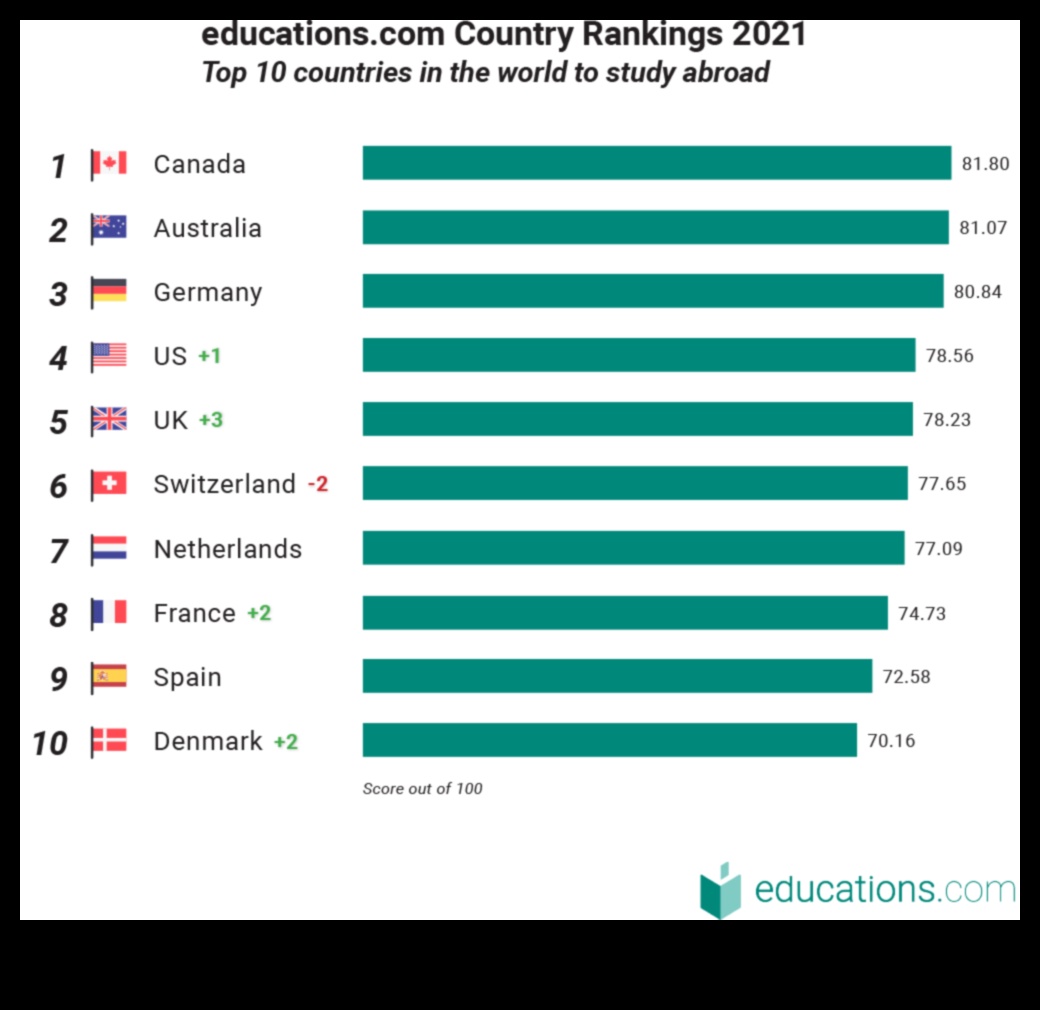
Where to Study Abroad
This guide provides information on the best places to study abroad, factors to consider when choosing a study abroad country, cost of studying abroad, scholarships and financial aid, visa requirements, health insurance, safety and security, cultural adaptation, and FAQ.
Introduction
Studying abroad is a great way to experience a new culture, learn a new language, and make lifelong friends. It can also be a great way to boost your resume and prepare for your future career.
There are many factors to consider when choosing a study abroad country, including the cost of living, the language spoken, the culture, and the educational system.
This guide will help you narrow down your options and choose the best place to study abroad for you.
Factors to Consider When Choosing a Study Abroad Country
When choosing a study abroad country, there are a few factors you should consider:
- Cost of living: The cost of living in different countries can vary significantly. You should make sure you have a budget in place before you start your search.
- Language: If you are not fluent in the language of the country you are considering studying in, you should make sure there are language learning resources available.
- Culture: The culture of a country can be very different from your own. It is important to do your research and make sure you are comfortable with the culture of the country you are considering studying in.
- Educational system: The educational system in different countries can vary significantly. You should make sure the educational system in the country you are considering studying in is a good fit for you.
Top 10 Best Countries to Study Abroad
The following is a list of the top 10 best countries to study abroad, based on factors such as cost of living, language, culture, and educational system:
- Canada
- Australia
- New Zealand
- United Kingdom
- Ireland
- France
- Germany
- Spain
- Italy
Cost of Studying Abroad
The cost of studying abroad can vary significantly depending on the country you choose, the type of program you participate in, and your lifestyle.
In general, you can expect to spend between $10,000 and $30,000 per year on studying abroad.
The following are some of the factors that can affect the cost of studying abroad:
- Tuition and fees: Tuition and fees vary significantly from country to country. In some countries, tuition and fees are free for international students. In other countries, tuition and fees can be very expensive.
- Living expenses: Living expenses also vary significantly from country to country. In some countries, you can live on a very tight budget. In other countries, you will need to have a more substantial budget to cover your living expenses.
- Airfare: Airfare can be a significant expense when studying abroad. You will need to factor in the cost of airfare when you are budgeting for your study abroad experience.
Scholarships and Financial Aid for Studying Abroad
There are a number of scholarships and financial aid opportunities available for students who want to study abroad.
The following are some of the most popular scholarships and financial aid opportunities for studying abroad:
- The Fulbright Scholarship Program: The Fulbright Scholarship Program is a U.S. government-sponsored program that provides scholarships for students to study abroad.
-
Feature Answer Study abroad The act of studying in a country other than your own. Best study abroad programs Programs that offer students the opportunity to study in a foreign country while also providing academic and cultural support. Top study abroad destinations Countries that are popular destinations for study abroad students. Affordable study abroad programs Programs that offer students the opportunity to study abroad at a reduced cost. Scholarships for study abroad Financial aid that is available to students who want to study abroad. 
II. Factors to consider when choosing a study abroad country
There are many factors to consider when choosing a study abroad country, including:
- Your academic interests
- Your budget
- Your visa requirements
- Your cultural preferences
- Your safety and security
It is important to weigh all of these factors carefully before making a decision about where to study abroad.
III. Top 10 best countries to study abroad
The following is a list of the top 10 best countries to study abroad, based on factors such as cost of living, safety, and academic reputation.
- Canada
- United Kingdom
- Australia
- New Zealand
- Ireland
- Germany
- France
- Spain
- Italy
For more information on each of these countries, please see the following articles:
- Top 10 Countries to Study Abroad
- Best Countries to Study Abroad
- The Best Countries to Study Abroad in 2023

IV. Cost of studying abroad
The cost of studying abroad can vary significantly depending on the country you choose to study in, the type of program you enroll in, and your living expenses.
In general, the cost of studying abroad is higher than the cost of studying in your home country. However, there are many ways to save money on studying abroad, such as by applying for scholarships and financial aid, working part-time, and living in a shared accommodation.
Here is a breakdown of the average cost of studying abroad per year:
- Tuition: $10,000 – $30,000
- Living expenses: $8,000 – $12,000
- Airfare: $1,000 – $2,000
- Other expenses: $2,000 – $4,000
Of course, these are just estimates, and the actual cost of studying abroad will vary depending on your individual circumstances.
For more information on the cost of studying abroad, you can visit the following websites:

V. Scholarships and financial aid for studying abroad
There are a number of scholarships and financial aid opportunities available for students who want to study abroad. These scholarships can help to cover the cost of tuition, room and board, travel, and other expenses.
Some of the most popular scholarships for studying abroad include:
- The Fulbright Scholarship Program
- The Gates Cambridge Scholarship
- The Rhodes Scholarship
- The Schwarzman Scholarship
- The Marshall Scholarship
In addition to these major scholarships, there are also a number of smaller scholarships and grants that are available. These scholarships are often offered by universities, colleges, and other organizations.
Students who are interested in studying abroad should research the different scholarships and financial aid opportunities that are available. They should also make sure to apply for scholarships early, as the application deadlines can be tight.
Studying abroad can be a great way to learn about a new culture, meet new people, and gain valuable life experiences. With the help of scholarships and financial aid, it is possible for students from all backgrounds to study abroad.

6. Cultural adaptation for international students
When you study abroad, you will be immersed in a new culture that is different from your own. This can be a challenging experience, but it can also be a very rewarding one. Here are some tips for adapting to a new culture as an international student:
- Be open to new experiences.
- Be willing to learn about the local culture.
- Try to make friends with local people.
- Be patient with yourself as you adjust to your new surroundings.
- Don’t be afraid to ask for help when you need it.
Adapting to a new culture takes time and effort, but it is an important part of the study abroad experience. By following these tips, you can make the most of your time abroad and learn a lot about yourself and the world around you.
VIII. Safety and security for international students
When considering where to study abroad, it is important to take into account the safety and security of the country you are considering. Some factors to consider include:
- The crime rate in the country
- The political stability of the country
- The level of discrimination against foreigners
- The availability of healthcare and other essential services
It is also important to be aware of the specific safety risks that international students may face, such as:
- Being targeted by criminals or scammers
- Being discriminated against by locals
- Having difficulty accessing healthcare or other essential services
- Being subject to cultural misunderstandings
By taking these factors into account, you can make an informed decision about whether a particular country is safe for you to study abroad.
Here are some tips for staying safe and secure while studying abroad:
- Be aware of your surroundings and avoid walking alone at night.
- Keep your valuables close to you and avoid flashing expensive jewelry or electronics.
- Be careful about what you drink and eat, and avoid accepting drinks from strangers.
- Learn about the local culture and customs so that you can avoid making any cultural faux pas.
- If you are ever in danger, call the police or the local embassy or consulate.
By following these tips, you can help to ensure your safety and security while studying abroad.
Safety and security for international students
As an international student, it is important to be aware of the safety and security risks that you may face while studying abroad. Here are some tips to help you stay safe and secure:
- Be aware of your surroundings and take precautions to stay safe. This includes being aware of your surroundings at night, avoiding isolated areas, and not walking alone.
- Be aware of the local laws and customs. This will help you avoid getting into trouble.
- If you are ever in danger, do not hesitate to call the police or other emergency services.
- Stay in touch with your family and friends back home. Let them know where you are and what you are doing.
For more information on safety and security for international students, please visit the following websites:
- U.S. Department of State – Overseas Security Advisory Council
- International Student – Safety and Security Tips for International Students
- Study International – Safety and Security Tips for International Students
IX. Cultural adaptation for international students
Cultural adaptation is the process of adjusting to a new culture. It can be a challenging experience for international students, who may come from very different cultural backgrounds than the country they are studying in.
There are a number of factors that can affect cultural adaptation, including:
- The size of the cultural difference between the student’s home country and the host country
- The student’s personality and coping skills
- The student’s social support network
- The student’s educational and career goals
International students who experience difficulty with cultural adaptation may experience a number of symptoms, including:
- Homesickness
- Feelings of isolation and loneliness
- Difficulty communicating with others
- Academic problems
- Depression and anxiety
If you are an international student who is struggling with cultural adaptation, there are a number of things you can do to help yourself cope. These include:
- Learn about the host country’s culture
- Get involved in social activities
- Seek out support from friends, family, and counselors
- Be patient with yourself
Cultural adaptation is a process that takes time and effort. However, with the right support, it is possible to successfully adjust to a new culture and thrive as an international student.
FAQ
Q: What are the factors to consider when choosing a study abroad country?
A: There are many factors to consider when choosing a study abroad country, including:
- Your academic interests
- Your budget
- Your visa requirements
- Your cultural preferences
- Your safety and security
Q: What are the top 10 best countries to study abroad?
A: The top 10 best countries to study abroad are:
- United States
- United Kingdom
- Australia
- Canada
- France
- Germany
- Spain
- Italy
- Japan
Q: How much does it cost to study abroad?
A: The cost of studying abroad varies depending on the country, the program, and the length of stay. However, you can expect to pay anywhere from \$10,000 to \$50,000 per year.